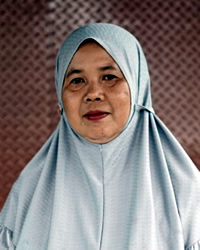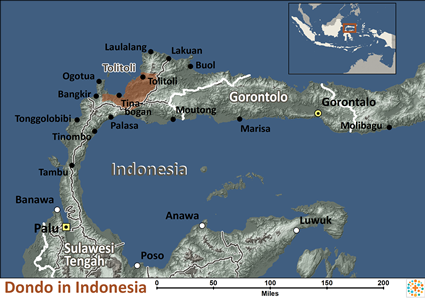The Dondo live in the districts of Baolan, Dondo, Galang and North Dampal in the Toli-Toli regency of Central Sulawesi. They tend to live in groups which are scattered over this entire area. Generally, they prefer to live by the riverbank in the jungle. These groups usually take the name of the rivers where they live, such as the Salungan, Ogomolobu, Oyom and Kambuno. The Dondo speak the language of Dondo. According to the Dondo people themselves, this language is different from the Toli-Toli language. This occurred because the Dondo are separated from the Tomini area. The people of Oyom village are the most traditional and isolated Dondo subgroup. The Dondo language is part of a larger linguistic grouping called the Nothern Tomini subgroup which also includes the Lauje and Tomini languages.
The principal livelihoods of the Dondo are farming and fishing. They practice migratory agriculture (shifting from one field to another) mainly because their farming practice depletes the nutrients in the land, and they cannot maintain the soil's fertility. New farmland is opened by cutting down trees and burning the underbrush (the slash and burn method). They tend to plant rice in unirrigated fields and have several secondary crops such as bananas, coconut, chocolate and coffee. The jungle is noted for its harvest of rattan, lumber and resin. They also hunt small deer (kijang), pigs and wild chickens. They hunt with spears, traps and bow and arrow and are helped by hunting dogs. The traditional house of the Dondo is built on a raised platform and made from wood, bamboo and rattan. Houses are raised off the ground as high as two meters. The houses are rectangular, roughly five by seven meters. Usually they have only one door and a ladder at the front of the house. Roofing is made from the leaf of the sago palm. In the past, Dondo was a sultanate. The Dondo sultan and his nobles and aides were chosen through their ancestral lines. During those times, there were four classes among the people: royalty, nobility, commoners and slaves. At 16 years old, a Dondo person is considered an adult. This status is symbolized by the young person having his or her teeth filed in a community ceremony. After marriage, the new bride and groom may choose to live with either the husband's or the wife's family. According to the Dondo custom, a man may have more than one wife. Divorce is permitted if the couple is no longer compatible. However, the divorce must be witnessed by a traditional leader (Kapitalau).
The Dondo have embraced Islam for many generations. However, many Dondo continue to practice animism, especially those who live in the highlands. Historically, the Dondo kept the body of a deceased family member inside a sago palm trunk that had been scraped out. The burial took place in the yard of the family residence and the family members bid farewell to the spirit of the deceased by sleeping around the grave for several days.
Agricultural training and help in the utilization of appropriate technology would help the Dondo increase their harvests. They also need significant help in improving the system of formal education in their area.
Pray for his kingdom to come and his will to be done among the Dondo people.
Pray for a movement of Dondo households to study the Bible and accept the blessings of Christ.
Pray for a spiritual hunger that will drive the Dondo people to the arms of Jesus.
Pray for workers who are filled with the fruit and the power of the Holy Spirit to go to the Dondo people.
Scripture Prayers for the Dondo in Indonesia.
IPN, 2011 Copyrighted © Used with permission.
| Profile Source: Joshua Project |

























